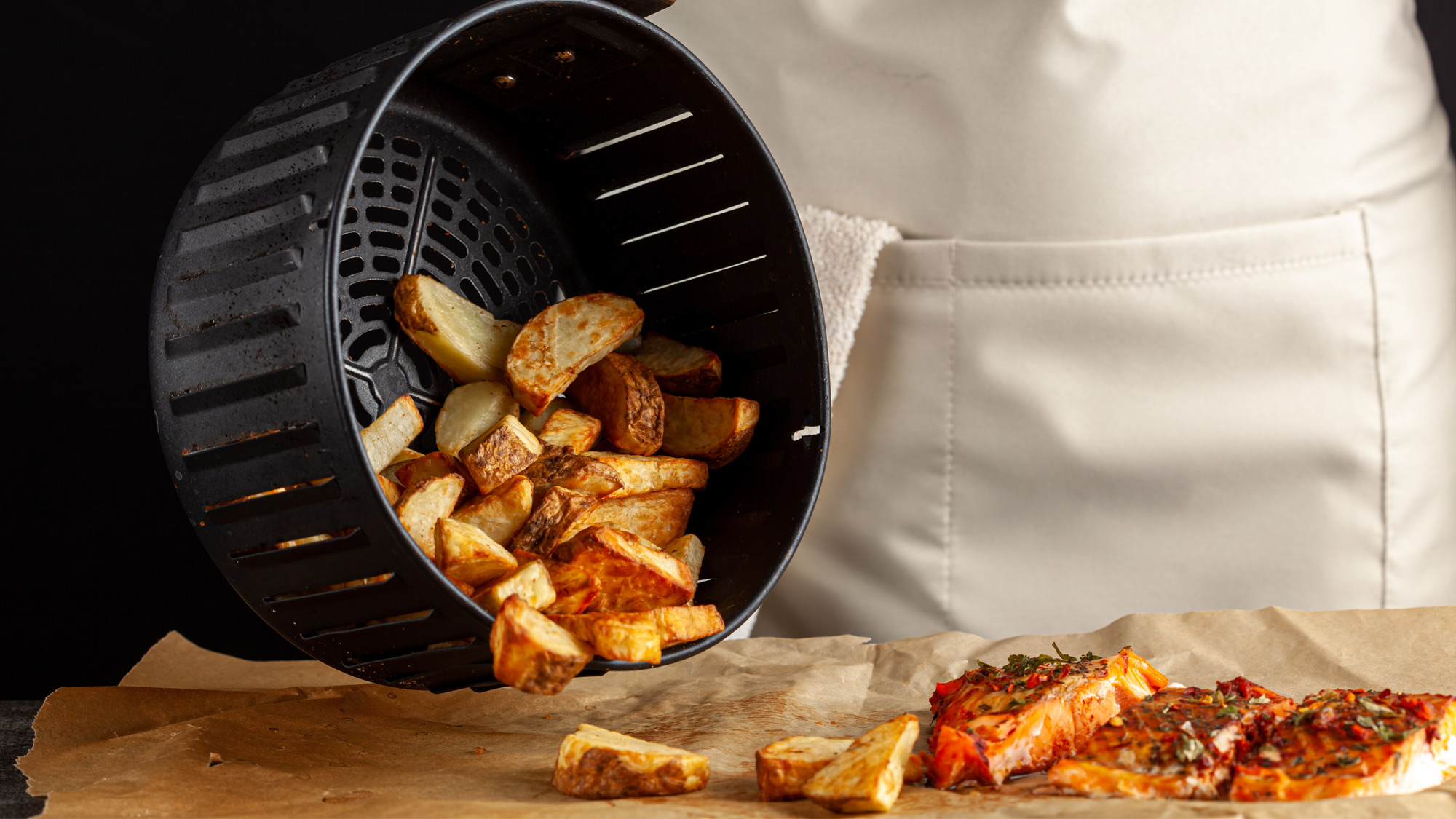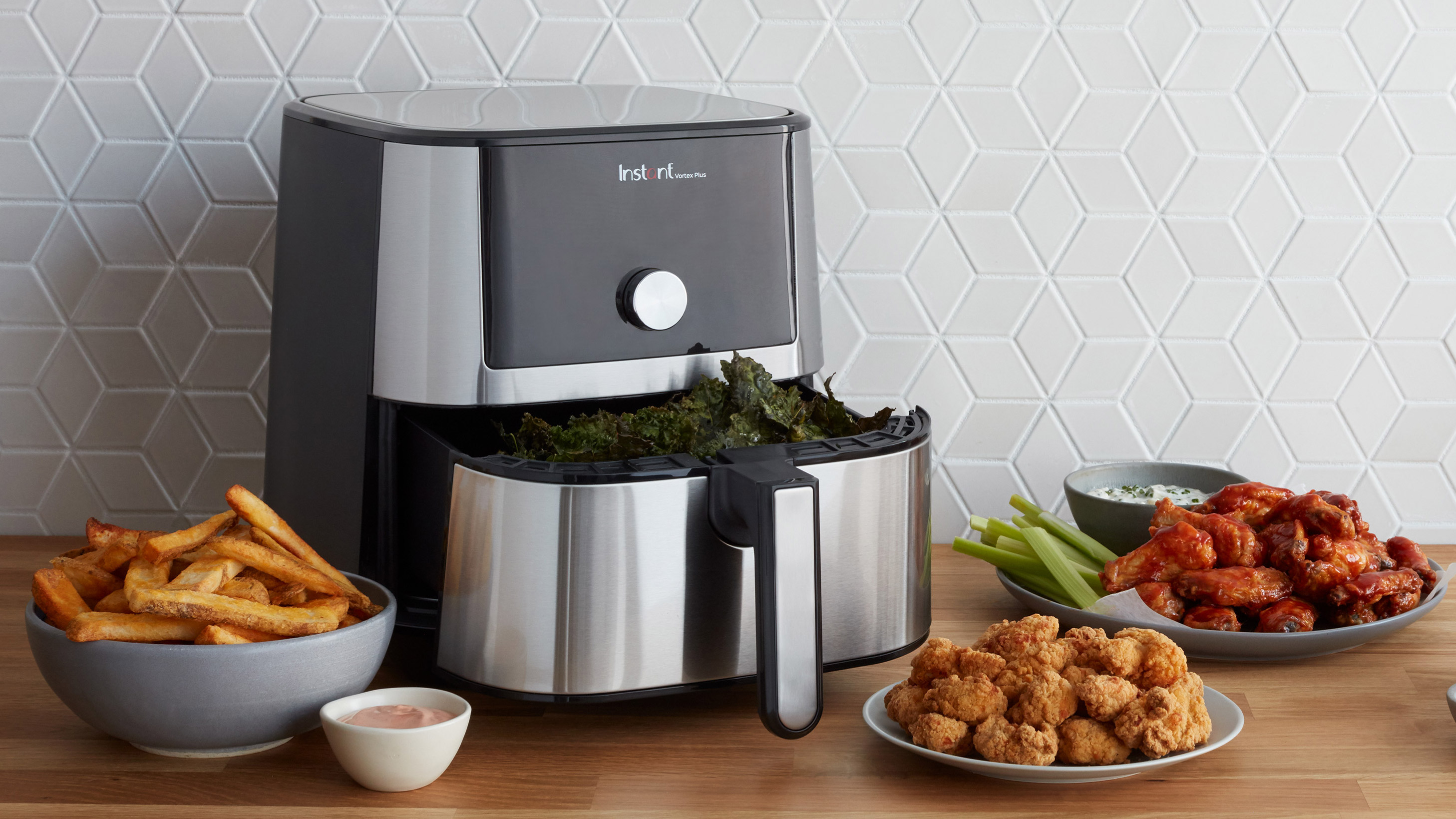For me, there’s nothing more comforting than a plate of fries. Whether it’s to accompany a juicy steak, a gut-busting burger, some fried chicken or just on their own dunked in ketchup, these crisp potato treats are quite frankly delish, and very moreish.
However, as they’re usually deep-fried in gallons of oil, they’re not particularly healthy. This is where an air fryer can help. These handy kitchen appliances first burst onto the market just over a decade ago, and have improved dramatically over the last ten years.
The best air fryers all use hot air, which quickly circulates around food to create the crisp, golden exterior usually associated with deep frying.
This also speeds up cooking times too compared to traditional cooking methods. So it’s no surprise they’re popular, with 25.6 million air fryers being sold in the US between January 2020 and December 2021, according to market research firm NPD.
I’ve been using an air fryer for just over a year now, and while I started off just cooking fries in the appliance, I soon discovered how versatile air fryers can be.
Over the past 12 months, I’ve cooked everything from fried chicken that rivals KFC to French Toast and even Krispy Kreme style donuts in my air fryer. However, there’s a few things I wish I’d known when I started air frying that would have made using this handy gadget even easier.
Best air fryer deals
Read on to discover what we wish we’d known when we started air frying - or, if you’ve already decided you want to invest in this handy kitchen appliance, check out the best prices on the best air fryers we like right now:
1. Experimentation is key
Most air fryers come with a recipe booklet or app that offers inspiration about what to cook in an air fryer. However, if you’re cooking frozen foods in an air fryer, or using the appliance to recreate dishes you usually prepare using traditional methods, most air fryers don’t come with any cooking charts or guidance to help you.
This means you will need to experiment. When it comes to frozen foods, I’ve found hotter temperatures are better, as the food needs to thaw and brown at the same time. If you set the cooking duration for too long, you’ll end up with over-cooked food, which may even be burnt at the edges.
I recommend using a temperature of around 400 F / 205 C for 15 minutes, after which you open the air fryer drawer and check the food. If it's not done to your liking, then cook for a couple of extra minutes at a time until you're happy.
When recreating your favorite dishes in an air fryer instead of an oven, experiment with the same temperature you’d usually use.
If you find your food is overdone then next time reduce the temperature by 40-50 F / 5-10 C, or increase it by the same amount if it doesn’t look browned enough (but is cooked through).
The same is true for a dish you’d deep fry such as donuts: set the air fryer to the temperature you’d heat the oil to.
However, if it's a dish you’d usually cook on the stove, there are no hard and fast rules regarding temperature.
We had great success when making grilled cheese in an air fryer by using it at 385 F / 196 C, so consider this as a starting point, but also do some research and look for dedicated air fryer recipes for the dish you’re planning to cook.
During my year with an air fryer, I’ve found the appliance can speed up cooking by as much as 50%, providing it's a dish you’d usually prepare in an oven.
Air fryers rarely speed up food prepared on the stove - instead, they ensure the browning and crispness is more consistent, and safer if it's a dish that’s usually deep-fried.
For food that takes around 20 to 25 minutes in an oven, reduce the cooking duration by around five to seven minutes, but be prepared to cook for a few additional minutes if it's not quite to your liking. If it’s usually cooked on the stove, set the air fryer for a similar cooking duration.

2. Pre-heating is necessary
Some air fryers have an automatic preheat function, which activates as soon as you switch on the appliance, while others require a manual preheat. Whichever model you have, don’t even think about skipping this step.
Preheating sees the hot air circulate in the air fryer's cavity bringing it to the correct temperature. This means as soon as you add food to the frying basket or bowl, moisture on the surface will start evaporating immediately, which causes it to brown and crisp.
If you add food to a cold basket, this process will take longer and you’ll find it won’t be as crisp or appetizingly browned after the cooking duration you programmed in.
3. Sometimes you don’t need to shake or turn food
Air fryer manufacturers always recommend that you should shake or turn the contents of the frying basket at least once, if not several times during the cooking process. Some even offer an audible and visual reminder for this.
Shaking ensures that the hot air can reach every inch of the food’s surface to crisp and brown it, which makes sense with fries and chicken wings.
However, it’s not always necessary. I found when cooking both pork belly and cinnamon rolls in an air fryer, turning the food would have hampered the cooking process. In the case of pork belly, I was aiming to get crisp, crunchy crackling on top, and turning the joint of meat wouldn’t have made that possible.
Similarly with cinnamon rolls, which are never turned when cooking in an oven, I wanted a crisp, evenly browned top, but the bottom simply needed to be cooked rather than browned.
So think about what you’re cooking in an air fryer and whether it really needs to be turned or shaken. If your air fryer has a reminder to shake, if you ignore it won’t hamper the cooking process in any way either.

4. Don’t overfill the basket
All air fryers come with a maximum capacity the frying basket can hold, but over the past year I’ve learnt that the closer you get to that figure, the less effective the air fryer is at evenly browning and crisping all of the food in the basket. This is because the hot air struggles to circulate around the food the fuller it is.
In my experience, an air fryer basket should be filled to no more than half its height to ensure food is evenly browned and fully cooked within the specified duration. For example, if you have a 6-quart / 5.7 liter air fryer, a 1lb / 454g batch of fries is the maximum amount you can cook to ensure optimum browning.
If you have a smaller capacity air fryer, or a model that has two frying baskets so you can cook different foods at the same time, such as the Ninja Foodi Max Dual Zone air fryer, then you will need to reduce the quantity.
We found in the smaller Instant Vortex Mini, which has a 2-quart / 2-liter capacity, the basket was comfortably able to hold a 0.7 lb / 300g batch of fries without affecting the crisping or browning.
Also when it comes to large items such as bread, cakes or even a whole chicken, the closer the food sits to the heating element in the top of the air fryer, the more likely they are to burn at the point closest to the top, so make sure they are a reasonable distance away from the element.
5. Use parchment paper or a baking tray
Air fryers are designed for food to be placed directly into the frying basket or bowl, but in some cases, such as cinnamon rolls or French Toast, this can leave a sticky mess for you to clean up, and since not all air fryer components are dishwasher safe this could be more time-consuming than the actual cooking.
During my year of air frying, I’ve discovered that parchment paper is a simple solution to this. When I made French Toast and cooked ice cream in an air fryer (yes, really) I found parchment paper ensured the food didn’t stick to the frying basket but didn’t hamper the browning process.
However, sometimes parchment paper isn’t always the most viable method - that was certainly the case with cinnamon rolls - to keep the rolls intact when transferring them to the air frying basket, I need something more stable. So I opted for an 8-inch metal baking tray, which also helped reflect the hot air a little more, browning the sides as well as the tops. You could go for a disposable foil tray too, but that’s less environmentally friendly.
If you are using a baking tin in an air fryer, always ensure there’s a gap of at least 1-inch / 2.5cm around the tray so the hot air can circulate properly, which could mean you need to invest in some smaller baking tins.
My year of air frying has been eye opening and, in many cases, has not only sped up how long it takes to prepare dishes, but also made my life in the kitchen far easier as I no longer have to watch certain foods like a hawk, as I would do if using the stove. I hope my experience over the past 12 months will make your air fryer journey a little smoother.
- Check out these great air fryer deals
from TechRadar - All the latest technology news https://ift.tt/L3ltQ2C




0 Comments